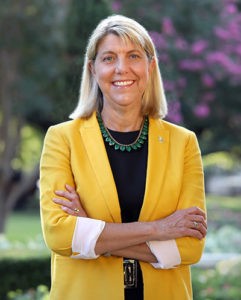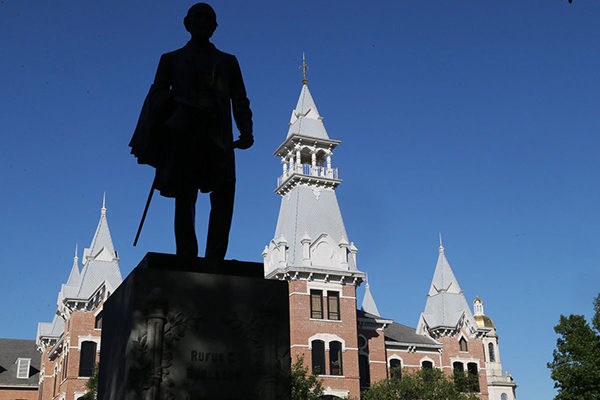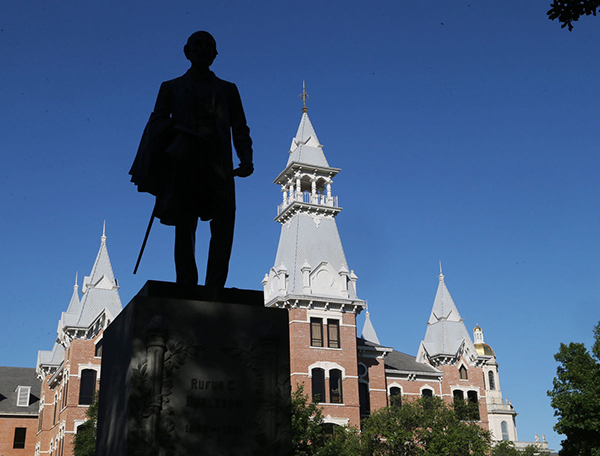Baylor University’s board of regents “accepted” a final report of its Commission on Historic Campus Representations Feb. 19 but will not release the findings to the public until the end of March.
Lori Fogleman, university spokesperson, said the report will be released after three university-wide forums are offered via Zoom March 2, March 9 and March 16. Those forums, part of the ongoing “Baylor Conversation Series: Perspectives on Our History,” will not address the specific recommendations, she said, but “are to provide historical context.”
No specific date for releasing the independent report was given, with a news release saying it would be released “by the end of March.”
Asked why a five-week delay was required before regents released the report, Fogleman said: “The commission’s report is quite extensive, as the members did a thorough job in examining Baylor’s history and proposing many recommendations. As the commission learned in its work, it’s important to have a good understanding of the greater context of the time period in which Baylor was founded (1845). That’s what we will work to provide through a series of three forums prior to the release of the commission’s full, independent report by the end of March.”
The regents have asked university administration to develop a proposed action plan regarding the recommendations, “as feasible and in accordance with existing board policies and procedures,” a university news release said. “The administration will provide a briefing for board consideration and action in accordance with existing board policies and procedures, prior to the implementation of any recommendation.”

Linda Livingstone (Photo/Baylor)
University President Linda Livingstone said: “The Commission’s report tells more than the story of Baylor’s history. It is a testament to the importance of telling the truth, of asking for forgiveness and of reaching out to others impacted by the institution of slavery in fulfillment of our Christian mission and in keeping with our Christian witness. We will take great care as we begin looking deeper at the commission’s recommendations to develop a proposed action plan for consideration by the board in the months ahead.”
Creation of the commission was announced July 6 by board of regents Chairman Mark Rountree and Livingstone. The commission was to report to the board of regents “no later than” Dec. 20, 2020.
The university news release said the commission delivered its final report to Rountree and Livingstone on Dec. 20 and that between that date and Feb. 19 regents “met in specially called sessions to be presented the report by commission co-chairs and other members of the commission.”
After that nine-week period, the regents “had their first, in-depth discussion as a full board” on Feb. 19, the news release said. After the presentation, the regents adopted a resolution of appreciation for the commission expressing “sincerest and abiding gratitude” to commission members “for their extensive labor and prayerful deliberation in the course of successfully fulfilling their charge.”
“We will take great care as we begin looking deeper at the commission’s recommendations to develop a proposed action plan for consideration by the board in the months ahead.”
When appointed in the summer — in the heat of the nation’s racial reckoning stirred by the murders of George Floyd, Breonna Taylor and other Black citizens as well as the racial overtones of the 2020 presidential election — the Baylor commission was given three charges beyond an assigned reporting date. Those were to:
- “Review the complete historical record and context of the university and its founders and early leaders, including historical connections to slavery and racial injustice.”
- “Propose a plan for documenting and communicating the complete history of Baylor and its founders and early leaders, including historical connections to slavery and racial injustice.”
- “Evaluate all statues, monuments, buildings and other aspects of campus within this complete historical context and in reference to the original intentions behind their physical location, placement and naming and provide observations for consideration.”
The three university forums scheduled for March will be led by Ronald Angelo Johnson, chair of Baylor’s History Department and will include panelists from universities in Texas and “other experts to discuss slavery in the United States, slavery in Texas and among Texas Baptists, and the historical findings of the commission and the framework for the recommendations.”
The commission’s three co-chairs were Alicia D.H. Monroe, provost and senior vice president for academic and faculty affairs at Baylor College of Medicine and a member of the board of regents; Gary Mortenson, professor and dean of Baylor’s School of Music; and Walter Abercrombie, associate athletics director for Baylor “B” Association.
Members of the commission included seven current students, four current or past members of the board of regents, five university staff members and six faculty members. Among the student representatives were a member of the Black Student Union, an officer with the Baylor NAACP and the student body president. According to Fogleman, the commission’s racial and ethnic breakdown was 14 Blacks, two Hispanics, one Asian and nine Caucasians.


